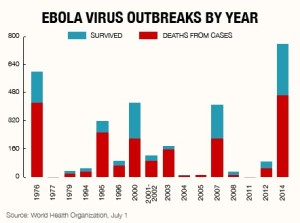The WHO reports there have been 759 cases, including 467 deaths in Guinea, Sierra Leone and Liberia since the Ebola outbreak began in March, according to a statement the organization released on Tuesday.
Ebola is a violent killer. The symptoms, at first, mimic the flu: headache, fever, fatigue. What comes next sounds like something out of a horror movie: significant diarrhea and vomiting, while the virus shuts off the blood’s ability to clot. As a result, patients often suffer internal and external hemorrhaging. Many die in an average of 10 days. People are traveling without realizing they’re carrying the deadly virus. It can take between two and 21 days after exposure for someone to feel sick. The good news is that Ebola isn’t as easily spread as one may think. A patient isn’t contagious — meaning they can’t spread the virus to other people — until they are already showing symptoms.
Ebola outbreaks usually are confined to remote areas, making the disease easier to contain. But this outbreak is different; patients have been identified in 60 locations in Guinea, Sierra Leone and Liberia.
“The epidemic is out of control,” says Dr. Bart Janssens, MSF director of operations. “With the appearance of new sites in Guinea, Sierra Leone and Liberia, there is a real risk of it spreading to other areas.”
Officials believe the wide footprint of this outbreak is partly because of the proximity between the jungle where the virus was first identified and cities such as Conakry. The capital of Guinea has a population of 2 million and an international airport.
Virus ‘should be easy to stop’
There is no cure for Ebola, but in theory the disease should be easy to fight, said Dr. Peter Piot, the scientist who first discovered the Ebola virus in the 1970s. “You need really close contact to become infected. So just being on the bus with someone with Ebola, that’s not a problem.” Simple hygienic measures like washing with soap and water, not re-using syringes, and avoiding contact with infected corpses are sufficient to stop spread of the disease, Piot said. “This is an epidemic of dysfunctional health systems,” he added. “Fear of the virus, and the lack of trust in government, in the health system, is as bad as the actual virus.”
